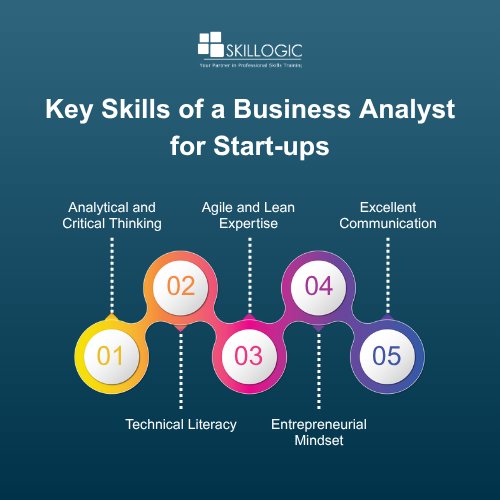Why Business Analysts Are the Secret Weapon of Start-ups
Discover how Business Analysts drive start-up success by aligning goals, streamlining processes, and turning data into actionable strategies.

Did you know nearly nine out of ten start-ups don’t survive beyond their first five years? A major factor contributing to this alarming figure is unclear strategy and ineffective decision-making. A standout product idea means little without a solid execution strategy in today’s cutthroat market.To turn vision into viable execution, start-ups need a strategic edge. This is where business analysts in start-ups play a crucial role. Often overlooked in early-stage planning, Business Analysts act as the bridge between vision and value. Their expertise in aligning business goals with actionable insights can make the difference between thriving and folding. India is projected to be the 3rd largest analytics market globally by 2027, after the US and China, due to increasing digitization and government initiatives like Digital India.
In this article, we'll explore in detail why start-ups need business analysts, and how they can contribute to sustainable growth, smarter decisions, and long-term success.
What Is the Role of a Business Analyst?
A business analyst in start-ups plays a crucial role in bridging the gap between business goals and technical solutions. In a start-up environment, this role becomes even more vital due to limited resources and the need for fast, strategic decisions. A Business Analyst works closely with stakeholders to understand the company’s objectives, gather and document requirements, analyze data, and translate insights into actionable plans. They help identify market opportunities, streamline internal processes, and ensure the product or service meets customer needs.
Business Analysts also facilitate communication between cross-functional teams such as developers, marketers, and executives, ensuring alignment and reducing miscommunication. By validating ideas with data and helping prioritize tasks based on impact, Business Analysts significantly reduce risks and enhance efficiency. Ultimately, a Business Analyst helps a start-up stay focused, agile, and customer-centric—making them a key contributor to business growth and long-term success.
The Times of India stated that the Indian IT sector is expected to witness a 15-20% increase in job opportunities in 2025, with specialized tech roles like AI and ML seeing a surge of 30-35%.
Read More:
- Why Every E-commerce Company Needs a Business Analyst
- Advanced Business Analysis Techniques for Professionals
- Cybersecurity Considerations for Business Analysts
Key Responsibilities of a Business Analyst
A Business Analyst examines business operations, uncovers improvement areas, and recommends solutions backed by data insights. Over 70% of enterprises globally now deploy business analysts in strategic roles to improve operational efficiency, customer experience, and competitive advantage. In a start-up setting, their role is even more dynamic and integral. Their business analyst responsibilities in start-ups typically include:
Bridging Vision and Technical Execution
A Business Analyst works closely with founders and stakeholders to grasp the overall vision and strategic goals of the start-up. They then break these high-level ideas into clear, actionable technical requirements that developers can implement, ensuring that the final product aligns with both business needs and user expectations.
Conducting market research and competitor analysis
Business Analysts gather insights from market trends, customer behaviours, and competitor strategies to identify gaps and opportunities. This helps the start-up position its offerings more effectively, avoid saturated markets, and design features or services that fulfill real, unmet needs—providing a strategic edge in product development and marketing.
Connecting Stakeholders, Developers, and Customers
Clear communication is essential in fast-moving start-ups. Business Analysts serve as a liaison, translating complex business goals into technical language for developers and simplifying technical feedback for non-technical stakeholders. They also collect customer input to ensure that user expectations are consistently met throughout the development cycle.
Analyzing data to inform decisions
Business Analysts use tools and techniques to collect and interpret data from various sources such as user analytics, sales reports, and operational metrics. These insights help decision-makers prioritize features, optimize resources, and track progress—enabling informed, evidence-based decision-making rather than relying on assumptions or intuition.
Crafting Clear Documentation for Project Success
A well-documented plan is crucial for effective execution. Business Analysts prepare detailed business cases to justify initiatives, write functional specifications to guide development, and create user stories to describe how users will interact with the product. These documents ensure clarity and consistency across all phases of the project.
Tracking Progress and Driving Adaptation
Even the best-laid plans require refinement. Business Analysts track performance metrics, gather stakeholder feedback, and assess project milestones to evaluate success. When goals aren't being met, they pivot quickly—redefining priorities, adjusting workflows, or recommending new strategies to keep the start-up on a path toward growth and profitability.
Read More:
- How to become a Business Analyst in India?
- Business Analytics Scope in India
- How to Become a Business Analytics Expert in India?
How Business Analysts Drive Start-up Success
Exploring the vital ways Business Analysts contribute to growth, efficiency, and strategic decision-making in start-ups.
Aligning Product Vision with Market Demand
One of the core strengths of a Business Analyst is understanding customer pain points and ensuring that the product addresses them. By mapping user journeys, gathering feedback, and testing concepts, Business Analysts ensure the product aligns with real market needs. This highlights how business analysts help start-ups succeed by keeping the focus on true customer value.
The rise of Augmented Analytics — AI-driven analytics that automate data preparation and insight generation — is expected to accelerate business analyst tool adoption, increasing productivity by up to 40%.
Translating Ideas into Actionable Plans
Start-ups often brim with creative ideas, but execution is where many falter. Business Analysts break down these ideas into tangible tasks, use cases, and workflows, enabling agile development.
Enabling Data-Driven Decisions
In the absence of historical data, start-ups need real-time, insightful metrics. Business Analysts pinpoint key performance indicators, monitor user activity, and evaluate patterns to guide strategic choices. This reduces guesswork and increases confidence in critical choices, underscoring why business analysis is critical for success.
Improving Cross-Functional Collaboration
Business Analysts are communicators. They bridge gaps between the tech team, marketing, finance, and leadership. Their role ensures that every stakeholder is aligned, reducing miscommunication and speeding up development cycles.
Mitigating Risks Early
Every start-up faces uncertainty. Business Analysts conduct SWOT analyses, identify potential pitfalls, and create contingency plans. This foresight helps start-ups pivot quickly and efficiently when needed, demonstrating how a business analyst reduces risk effectively.
According to Wikipedia, India's Artificial Intelligence (AI) market is expected to reach USD 8 billion by 2025, growing at a CAGR of over 40% between 2020 and 2025.
Real-Life Examples of Business Analyst Impact
Here are some real-life examples that show how Business Analysts (BAs) make a real impact in various industries:
Case Study 1: The E-Commerce Pivot
A bootstrapped e-commerce start-up was experiencing stagnant growth. A Business Analyst was brought in to conduct customer feedback sessions, analyze website behaviour, and identify drop-off points in the conversion funnel. The result? A simplified checkout process and targeted marketing campaign that increased sales by 40% within three months.
Case Study 2: The SaaS Survival
A SaaS start-up was building multiple features with no real user validation. Business Analyst initiated surveys, conducted competitor benchmarking, and performed a cost-benefit analysis of each feature. The start-up re-focused on its core offering and reduced burn rate by 25%, eventually attracting seed funding. This example illustrates the importance of business analysts in SaaS who help maintain focus and efficient resource use.
Read More:
- Business Analytics Course Fee in Mumbai
- Business Analytics Course Fee in Chandigarh
- Business Analytics Course Fee in Kolkata

Key Skills to Look for in a Business Analyst for Start-ups
Finding the right Business Analyst means identifying key skills that align with the fast-paced, dynamic nature of start-up environments. These business analyst skills for start-ups include:
Analytical and Critical Thinking
A Business Analyst must break down complex issues into manageable parts, identify patterns, and assess implications. They use logic and structured thinking to evaluate options and recommend the best course of action. This skill is essential for uncovering root causes, forecasting outcomes, and developing data-driven strategies that reduce risk.
Agile and Lean Expertise
Understanding agile and lean methodologies helps Business Analysts function effectively in dynamic start-up environments. Familiarity with frameworks like Scrum and Kanban enables them to support iterative development, prioritize tasks efficiently, and respond quickly to changes. Lean principles also promote minimal waste, continuous feedback, and value-focused progress across teams. Utilizing business analyst tools for agile further enhances these capabilities.
Excellent Communication
Strong communication skills allow Business Analysts to convey complex ideas clearly and ensure all stakeholders—technical and non-technical—are aligned. They must listen actively, ask the right questions, and translate business goals into actionable language. Effective communication reduces misunderstandings, speeds up development, and strengthens collaboration across departments, clients, and partners.
Technical Literacy
While not developers themselves, Business Analysts benefit from understanding technical concepts like APIs, data structures, and user experience (UX) fundamentals. This literacy allows them to converse effectively with engineers, anticipate development challenges, and contribute meaningfully to system design. It ensures smoother workflows and better alignment between business needs and technical execution.
Professional certifications such as CBAP (Certified Business Analysis Professional) and PMI-PBA (Professional in Business Analysis) have seen a 20% rise in enrollments in India since 2023, reflecting the rising value placed on formal Business Analyst credentials.
Entrepreneurial Mindset
Start-ups demand flexibility, ownership, and initiative. A Business Analyst with an entrepreneurial mindset is proactive, embraces uncertainty, and seeks innovative solutions. They understand the urgency of start-up culture, adapt quickly to new roles, and make decisions that balance short-term survival with long-term vision—driving growth and resilience in the business.
Business Analysts are more than just data crunchers or requirement writers – they are strategic partners who drive clarity, alignment, and execution. In the chaotic, high-stakes world of start-ups, a skilled Business Analyst can be the difference between iteration and stagnation, success and shutdown.
If you're a start-up founder juggling multiple roles and constantly putting out fires, it might be time to bring in a secret weapon. A Business Analyst can help you shift from survival mode to strategic growth. In a world where most start-ups fail, having the right people onboard is not a luxury – it’s a necessity.
If you're looking to break into this rapidly growing field or elevate your current role, the right training can be a game-changer. Enrolling in a Business Analyst course in Mumbai is a strategic step toward seizing opportunities in the evolving digital economy.
SKILLOGIC’s Offline Business Analyst course in Mumbai provides practical, hands-on learning led by industry experts, along with globally recognized certifications. With a decade-long presence across major Indian cities, SKILLOGIC delivers in-demand skills across business analytics, Six Sigma, PMP, cybersecurity, and cloud technologies—empowering you to succeed in today's fast-paced, tech-driven landscape.

0
209